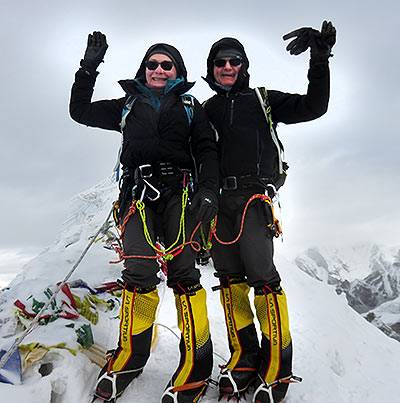Reaching for the Summit: Husband-and-Wife UMSOM Professors Climb Mount Everest
July 29, 2024 Lauren Wright
Read about the journey of Konstantin G. Birukov, MD, PhD, and Anna A. Birukova, MD, in the latest issue of “CATALYST” magazine.
Photo: Anna A. Birukova, MD, and Konstantin G. Birukov, MD, PhD, during their Mount Everest climb.
Located in the Himalayas between Nepal and Tibet, Mount Everest stands as the highest Himalayan Mountain at 29,032 feet above sea level. It is considered the highest point on Earth, and nearly 800 climbers attempt to trek to its peak every year.
The University of Maryland School of Medicine’s (UMSOM) Konstantin G. Birukov, MD, PhD, the Anesthesiology Endowed Professor of Entrepreneurial Research and director of the UMSOM Lung Biology Research Program, and his wife, Anna A. Birukova, MD, professor of medicine at UMSOM and director of basic research, Division of Pulmonary and Critical Care Medicine, made the unfathomable climb to the top of Mount Everest in spring 2023.
Their motivation behind the climb was simple: They believed in what they were doing. Their drive to reach the top of Everest is the same force, they say, that inspires them in their research as physician-scientists. Birukov’s research focuses on the pathologic mechanisms of development and resolution of vascular endothelial dysfunction and lung injury. These are two key features of many life-threatening conditions including ARDS, shock/trauma, and sepsis. Birukova’s research focuses on molecular regulation of the vascular endothelial barrier and inflammation in lung disease.
“In our scientific careers, and in the mountains, we simply believe in what we do. That is our key to success. Our motto is ‘Up, up, and up. Step by step, foot by foot, all the way to the top,’ ” Birukov said.
Two-Month Expedition
On April 12, 2023, Birukov and Birukova arrived at the Everest Base Camp in Nepal to embark on their two-month expedition. They spent nearly 40 days in subzero temperatures at altitudes above 18,000 feet. During several of their acclimatization climbs to the Nepalese mountain, Lobuche, and Mount Everest high camps, they reached astonishing altitudes of 20,000 and 23,000 feet. On average, climbers require three to four weeks to adapt to the high-altitude, low-oxygen environment. As second-time climbers to Mount Everest, they were well-versed in the necessary preparations to survive the summit.
“Over the years, our marathon training has helped us to prepare,” Birukov said. “We have frequented over 20-mile-long hiking trails at Great Falls Park. We also prepared ourselves by making a couple of ‘Rim-to-Rim-to-Rim’ 47-mile, nonstop hikes in the Grand Canyon. We even summited another 26,781-foot-high Himalayan peak, Manaslu, a few years earlier and accomplished less-demanding summits including Montblanc in the French Alps and Kilimanjaro in Tanzania.”
Along with staying in shape and maintaining a healthy diet, the couple prepared a “survival pack” for the summit that consisted of climbing gear, zinc sunscreen, one-piece down suits, boots, clothing for inner layers, insulated socks, gloves, mittens, and eye protection.
“Staying in the Base Camp, we were training every day, doing ice climbing and steep hikes to maintain our fitness. Our meals mainly consisted of vacuum-dried foods, vegetables, rice, and tea,” Birukov said.
Finally, a “climbing window” opened for May 16-18, with a “mild” temperature of minus 20 degrees Fahrenheit and winds less than 45 mph.
Read more about the couple's climb in the latest issue of CATALYST magazine.
You can read the Spring 2024 issue of CATALYST magazine, which highlights UMB's new “Climate Change, Health, and Society” elective; innovations such as the School of Dentistry's Division of Artificial Intelligence Research; Carin Cardella, public information officer for UMB Police and Public Safety who has answered the call during state emergencies; the Francis King Carey School of Law celebrating 200 years; new Health Sciences and Human Services Library Dean Emily Hurst and Chief Philanthropy Officer Greg Bowden; Fahren Nipple, autopsy assistant for the Office of the Chief Medical Examiner and assistant program director for the Master of Science in Forensic Medicine at the Graduate School; and much, much more!